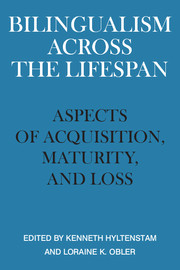Book contents
- Frontmatter
- Contents
- List of contributors
- Preface
- 1 Bilingualism across the lifespan: an introduction
- 2 Early differentiation of languages in bilingual children
- 3 Variation in children's ability to learn second languages
- 4 Idiomaticity as an indicator of second language proficiency
- 5 Prefabs, patterns and rules in interaction? Formulaic speech in adult learners' L2 Swedish
- 6 The imperfect conditional
- 7 Spanish, Japanese and Chinese speakers' acquisition of English relative clauses: new evidence for the headdirection parameter
- 8 Distinguishing language contact phenomena: evidence from Finnish–English bilingualism
- 9 The boustrophedal brain: laterality and dyslexia in bi-directional readers
- 10 Deterioration and creativity in childhood bilingualism
- 11 Crosslinguistic influence in language loss
- 12 Bilingualism in Alzheimer's dementia: two case studies
- 13 Language processing in the bilingual: evidence from language mixing
- Index
6 - The imperfect conditional
Published online by Cambridge University Press: 05 June 2012
- Frontmatter
- Contents
- List of contributors
- Preface
- 1 Bilingualism across the lifespan: an introduction
- 2 Early differentiation of languages in bilingual children
- 3 Variation in children's ability to learn second languages
- 4 Idiomaticity as an indicator of second language proficiency
- 5 Prefabs, patterns and rules in interaction? Formulaic speech in adult learners' L2 Swedish
- 6 The imperfect conditional
- 7 Spanish, Japanese and Chinese speakers' acquisition of English relative clauses: new evidence for the headdirection parameter
- 8 Distinguishing language contact phenomena: evidence from Finnish–English bilingualism
- 9 The boustrophedal brain: laterality and dyslexia in bi-directional readers
- 10 Deterioration and creativity in childhood bilingualism
- 11 Crosslinguistic influence in language loss
- 12 Bilingualism in Alzheimer's dementia: two case studies
- 13 Language processing in the bilingual: evidence from language mixing
- Index
Summary
Introduction
The Dutch have a reputation for being good at speaking English. Their prowess in this regard cannot simply be attributed to the presence of English in the school curriculum. For one thing, Dutch and English are typologically close; for another, there is also considerable exposure to English through the media. English and American productions feature regularly on Dutch TV and in the cinema and are never dubbed, and English-medium radio and television are becoming widely available. English-language books sell so well that the British publishing trade apparently sees the Netherlands as simply another part of the home market. The Dutch success in learning English also reflects an attitude fully commensurate with the commercial importance of the nation and the insignificance of Dutch as a world language. Furthermore, the Dutch language, unlike French, does not have its official band of zealous guardians; it is a language that borrows happily, particularly from English.
Despite the high level of linguistic achievement, it is obvious to any experienced observer that the majority of Dutch speakers remain unmistakably Dutch in their command of English. This is not merely a matter of pronunciation, but also of “accent” in other linguistic domains (see Scarcella, 1983). These particular “accents” take the form of characteristic features which are said to have fossilized (Selinker, 1974).
- Type
- Chapter
- Information
- Bilingualism across the LifespanAspects of Acquisition, Maturity and Loss, pp. 87 - 115Publisher: Cambridge University PressPrint publication year: 1989
- 9
- Cited by



